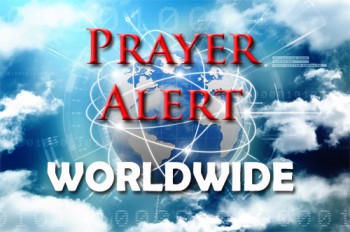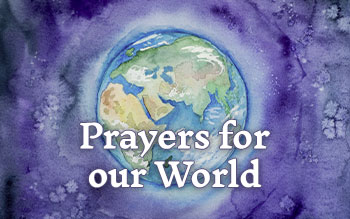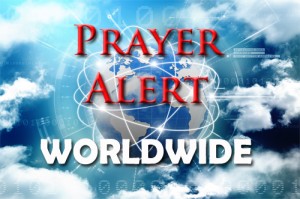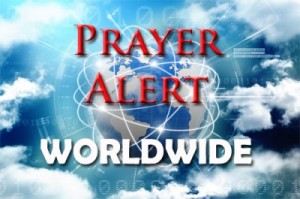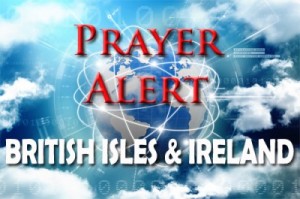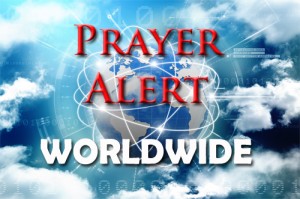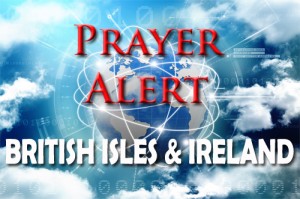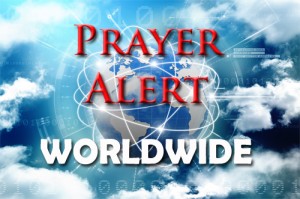Displaying items by tag: religious persecution
Kazakhstan: officials harass churches
Officials are harassing founders of religious communities, possibly trying to block applications to exist. In May police began harassing Oskemen's New Life Protestant Church as it sought re-registration after changing its name. Officers visited parishioners late at night, threatening one woman in her late 70s. People who give their names as founders of religious organisations applying for legal status continue to face harassment and intrusive questioning. Against international law, Kazakhstan bans all exercise of freedom of religion and belief without state permission. The UN Human Rights Committee states, ‘No one can be compelled to reveal his thoughts or adherence to a religion or belief.’ A church member said, ‘At present the founders do not think that their rights are being protected by the law or its representatives. We are being subjected to pressure, which cannot help but arouse concern about the right to freedom of conscience in Kazakhstan.’
Russia: Religious Clampdown Spreading
MOSCOW - In Verkhnebakansky, a town just outside Novorossiisk on Russia's Black Sea Coast, Baptists gather in a small house with a set of windows in the shape of a Christian cross.
Their presence in the Krasnodar region goes back 110 years, the past 25 of which -- since the Soviet collapse and the opening up of religious expression -- have seen a faith long repressed by authorities flourish once again.
So it was a shock when, on April 7, as some 50 congregants celebrated Annunciation, law enforcement agents stormed in and interrupted the service.
According to presbyter Yevgeny Kokora, the choir temporarily halted its rendition of Jesus Is My Lighthouse while the pastor pleaded with the officers. They wrote up a report and left just as the service was drawing to a close.
The following day, Kokora went with 71-year-old pastor YuryKorniyenko to the prosecutor's office in Novorossiisk, seeking to file an official complaint. They were told the prosecutor wouldn't be taking visitors for the next three weeks. The local branch of Russia's Federal Security Service (FSB) heard the two Baptists out, Kokora told RFE/RL, but made no promises.
On April 9, Korniyenko received a court summons and was subsequently charged with engaging in illegal missionary work. His case will be heard this week, and he faces a hefty fine if convicted.
"This is the first time we've had such troubles," Kokora told RFE/RL in a telephone interview. "I don't understand who needs this, who's playing this card."
While freedom of religion is constitutionally guaranteed in Russia, the relevant legislation names Orthodox Christianity, Islam, Judaism, and Buddhism as the country's four traditional, protected religions. Others with smaller presences in Russia, including denominations like Baptists, have been subjected to increased scrutiny in recent years.
In 2016, Russia introduced a package of laws outlawing missionary work outside officially designated places of worship, part a broader crackdown on minority faiths operating in the country.
The new laws have been cited as necessary measures in the state's fight against extremism and have led to charges against hundreds of religious activists across the country and, in 2017, to an outright ban on Jehovah's Witnesses, a Christian denomination with headquarters in the United States.
Roman Lunkin, a religious expert at the Russian Academy of Sciences, told RFE/RL that the Baptists in the Krasnodar region are falling victim to "not so much an expansion" of the government's campaign against minority religions as "its logical continuation."
The implication, he said, is that the clampdown will spread.
So far, the Baptist church in Russia has kept comparatively under the radar, despite a flock that Lunkin estimates at more than 250,000 people. Its members stand out from those of other minority faiths through their strong "civic stance," Lunkin said -- many are community leaders or members of local government.
But in November, its adherents were shaken by news that a pastor in Tatarstan had been fined 20,000 rubles ($310) for organizing an unsanctioned public gathering: A group of Baptists had assembled that June to watch him baptize their newest member in the Kama River.
Kokora said he believes the campaign against his congregation is a largely local affair, a case of officials trying to curry favor with their superiors. He noted that Novorossiisk has seen several similar cases in recent weeks, but faith groups in other parts of Krasnodar have been largely left alone.
In March, the Pentecostal meeting house in Novorosiisk was torn down after officials declared it an unauthorized construction. Seventh-Day Adventists in the city have been banned from gathering for worship, Kokora said. They now travel to Gelendzhik, 50 kilometers away.
On March 1, law enforcement officers in Novorossiisk detained two Mormons -- Americans KoleBrodowski, 20, and David Gaag, 19 -- on suspicion of violating Russian immigration law. They were released two weeks later and deported to the United States.
The Baptist congregation in Verkhnebakansky has felt pressure from the authorities grow over the past year, according to Kokora. He said they've had weekly calls from officials demanding summaries of the latest sermon delivered, as well as reports on attendance.
On April 21, the deputy head of the Russian Baptist Union, Viktor Ignatenkov, visited Verkhnebakansky to discuss the April 7 incident and the possible legal repercussions for local church members. The meetings "gave everyone a sense of confidence in God's intercession," the church said in a statement on April 23.
Kokora, who spent four years working in the Novorossiisk administration and was a member of the city's civic council, said he is reluctant to try and leverage his official contacts and plans instead to take the legal route by appealing to the Presidential Council for Civil Society and Human Rights in Moscow.
"We have laws, and we have courts. Let's fix this through a legal framework," he said.
That council may be the last hope for groups who feel targeted for their faith.
On December 11, in a meeting with council members, President Vladimir Putin suggested that official policy toward some religions should be liberalized.
"We probably can, and even at some point should, be much more liberal toward representatives of various religious sects," he said.
Putin ordered Supreme Court Justice Vyacheslav Lebedev to oversee the drafting of a general legal framework for adjudicating cases brought against religious groups. The deadline is July 1.
Kokora is among thousands of believers vesting their hopes in the initiative as a chance to reverse what they see as a tightening of the screws on Russia’s minority faiths.
In the meantime, he awaits the court's judgment.
"If this case becomes a precedent, then all our congregations will fall like a house of cards," he said. "The administration's hands will be untied."
Pray for theseefforts of Kokorato succeed -as he challenges the government’soppressive treatment of people due to them practicing their faith.
Pray for the persecuted Christians and their families. May they be richly rewarded for being strong in adversity.
Myanmar: religious persecution
Myanmar has 100+ ethnic groups, and over 2,200 Buddhist temples. It is rich in natural resources such as gems, oil, and natural gas. The military holds great influence in the government, forcibly repressing popular democratic movements and exploiting the country's rich natural resources, leaving the nation’s economy in shambles. Many are in poverty. Additionally, Myanmar suffers the second highest HIV/AIDS rate in southeast Asia, with a reported 54% of adults and 78% of children receiving treatment. The creation and use of illegal drugs is a contributing factor to this epidemic. It has been reported that at least 200,000 households are involved in the production of poppies, the source of illegal opiates. Recently, the largest human exodus since the Vietnam War began as Rohingya Muslims were driven out in what the UN described as ‘ethnic cleansing at the hands of the military’. Myanmar is 80% Buddhist, 8% Christian, and 7% Muslim. 84% remain unreached with the Gospel. Freedom of religion is restricted. The military actively promote Buddhism.
Iran 2: persecuted but not forsaken
Please stand in solidarity and prayer for Christians imprisoned in Iran on false political charges because of their faith. These include: Maryam - house church member, in Evin since July 2013, serving a four-year sentence. Ebrahim - house church member, in Evin since August 2013, serving a one-year sentence, followed by two years’ exile to a border town. In March 2015 he was given a further five years' imprisonment. Behnam - house church leader, in Ghezel Hesar prison since May 2011, serving a six-year sentence. In 2014 he was given a further six years. Vruir - an ordained pastor, currently under house arrest for 3-5 years. Three of his congregation are believed to be in prison. Shahin - given 2.5 years’ sentence in July 2013. Released in December 2013 and then taken to serve his sentence in April 2014. Mohammad was imprisoned on 5 July 2014 for a six-year sentence. Massoud began his five-year sentence on 9 November 2014.
Prison chaplain ousted for 'extreme' Christian views
Paul Song, 48, was a prison chaplain but claims he was forced out of his job at Brixton prison after the new Muslim managing chaplain there accused him of holding 'extreme' views. He had worked at the jail since 1998; he had started running Alpha courses and the Just10 course, all with the blessing of the former senior chaplain Reverend Phillip Chadder. The demand for the courses over the years was considerable. Mohammed Yusuf Ahmed, who took over as managing chaplain in 2015, told Song he wanted to 'change the Christian domination' at the prison and that the courses he taught were 'too radical'. Pastor Song, a respected AOG Pastor from South Korea, also leads the Shepherd Church in London. He is being advised by the Christian Legal Centre, which said, ‘To call this Christian who has served without a blemish for almost twenty years an extremist defies belief.'
Australia: Enemies of Christianity at work
A non-Christian journalist called the Christians of Australia to ‘open your eyes to what is happening around you and prepare for persecution in the dark days ahead’. He calls for strong Church leaders to arise. He said that ‘whilst I am not a Christian I stand amazed that Christian bishops and ministers are not warning Christians of what is already breaking over their heads.’ He comments on Queensland's Education Department warning schools against letting students speak about Jesus in the playground; two Christian preachers summoned to Tasmania's Anti-Discrimination Tribunal for preaching their faith’s stand on traditional marriage; Sydney University's Student Union threatening to deregister their Evangelical Union unless it stopped members declaring their faith in Christ; Coopers Brewery being bullied into taking down a video of a Christian MP debating same-sex marriage; and IBM, PwC and Sydney University being lobbied to punish staff belonging to Christian groups opposed to same-sex marriage. And the list goes on.
Christian NHS worker’s legal battle
On 27 July Victoria Wasteney attended court in the next stage of her long legal battle. As head of forensic occupational therapy at a London hospital she was suspended for 'gross misconduct' for nine months and received a written warning, following allegations of 'harassment and bullying' by a Muslim staff-member. She appealed to the Employment Appeal Tribunal when the judge recognised the significance of her case in protecting religious freedom. The judge said that the tribunal should consider whether the original ruling had properly applied the European Convention on Human Rights' strong protection of freedom of religion and expression. When she lost her appeal, Victoria applied for permission to appeal the tribunal's decision to the Court of Appeal, but this was refused. She is now seeking to challenge this, with support from Christian Concern.
Libya: violence and persecution
Recent fighting between rival militias in Tripoli shattered a period of calm. Egyptian planes are now striking east Libya in response to an attack against Egyptian Christians on 29 May (see the previous article). There are three rival governments vying for control. Ongoing Christian persecution is fuelled by the anarchy and violent conflicts by Islamic militias. Both Libyan converts to Christianity from Islam and expatriate Christians are experiencing extreme pressure and high levels of violence, due to the freedom that the perpetrators have. Libya has enormous problems, but we have an even more enormous God. We can pray for the development of a unified government that will end the rising threat of IS. We can pray for the ports to function again, so that exporting oil and importing goods can resume and economic stability return. And we can pray for religious freedom to be established, and for many to listen to religious broadcasting (see the next article).
